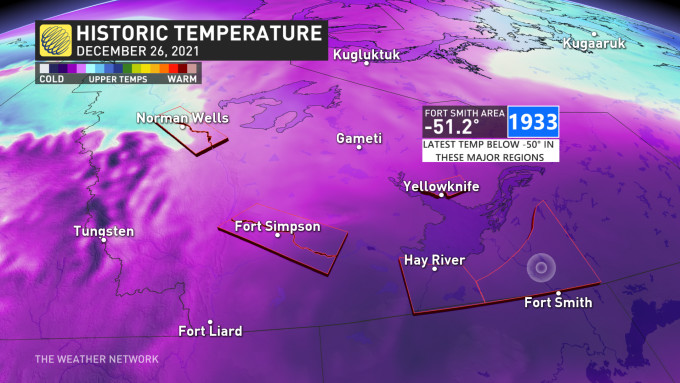Canada records temperature below -51°C for the first time eight years

The bone-chilling cold that has engulfed parts of northern and western Canada over the past few days continues to clench its iron grip on the region.
For the first time in eight years, a temperature below -51°C (-59.8°F) has been recorded in Canada.
On December 26 around 2:00 p.m. EST, a temperature of -51.1°C was recorded in Rabbit Kettle, Northwest Territories, while Louisbourg, Nova Scotia simultaneously became the warmest spot in the country at a balmy 4.6°C (40.3°F), which is an impressive national range of nearly 56 degrees.

The last time Canada saw a temperature below -51°C was in Eureka, Nunavut in February 2013. There are a limited number of weather stations in northern Canada, which means that some areas might have experienced even colder temperatures that were not officially recorded.
Other weather stations in Canada, such as the ones in Watson Lake, Yukon and Deadmen Valley, Northwest Territories are not far behind Rabbit Kettle, with recordings of -47°C at 5:00 p.m. EST on December 26. With a wind chill, temperatures in these areas could easily feel like -50 or -60.
These extremely cold temperatures are far from normal and these regions in northern Canada typically see values ranging from -10°C to -30°C during the last week of December.
The only other place on the planet that is also experiencing extreme cold is Jakutsk in northern Russia, where temperatures are ranging from -40°C to -50°C.
A portion of the polar vortex that has wandered south from the North Pole has continued to reside over these areas in Canada and cause temperatures to plummet. Meteorologists say that this extreme cold pattern may last through the week in these regions until the pattern changes and the cold air can escape into eastern Canada.

Major cities in the southern Prairies are expected to see widespread wind chill values in the -30s and -40s this week. The northern Territories and Prairie provinces should prepare for minimal time outdoors, as frostbite can occur in 10-30 mins when the wind chill values are between -28 and -39.
Forecasters say that a possible pattern reversal could arrive in early 2022 and bring some relief from the dangerous cold.
While parts of Canada are experiencing historically cold weather, many regions in the world are seeing abnormally warm conditions. The U.S. National Weather Service stated that Rio Grande Valley, Texas recorded a high of 34.4°C (94°C) on December 25th, which is the hottest temperature ever recorded on Christmas Day in the United States. Several other areas in Texas and the mid-Mississippi Valley have also experienced exceptionally warm conditions recently.










